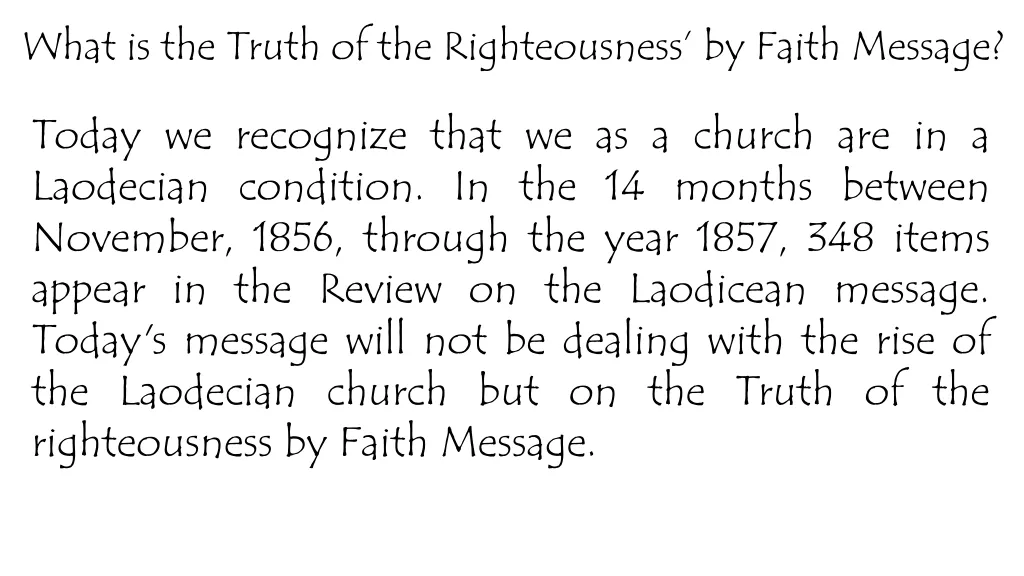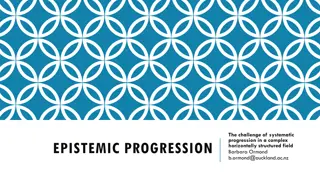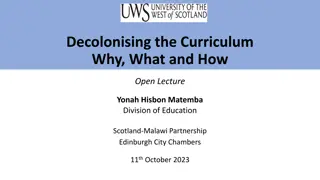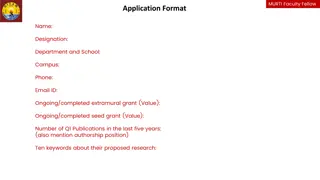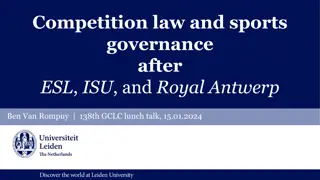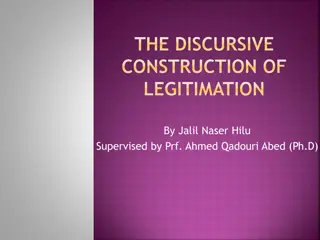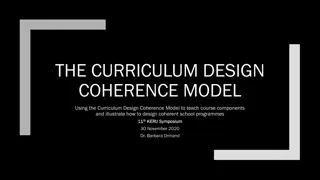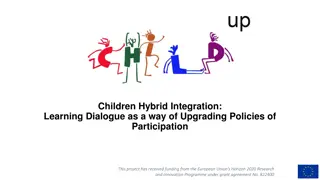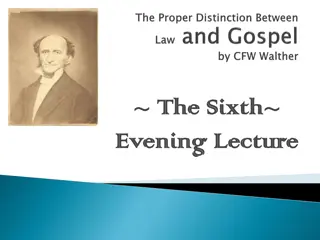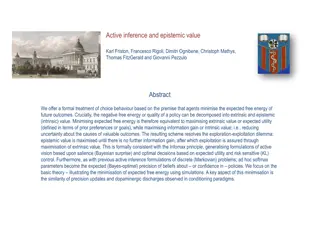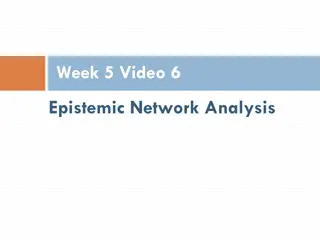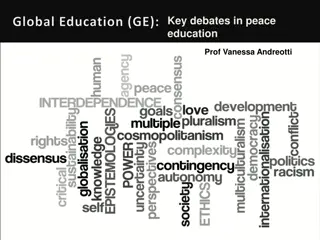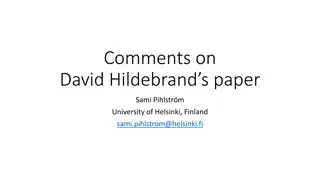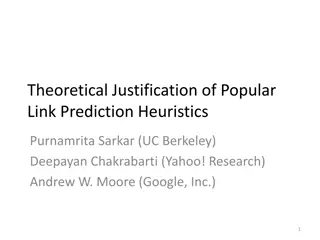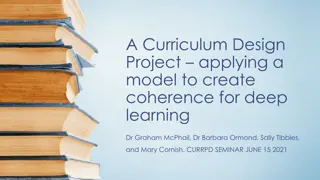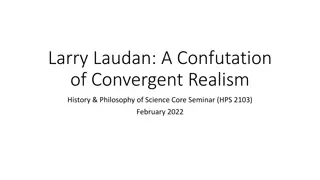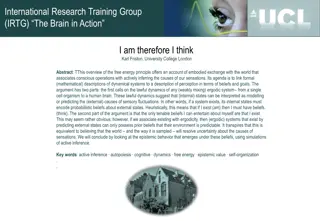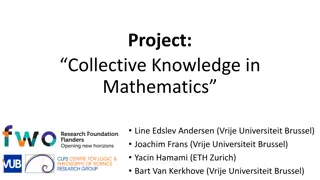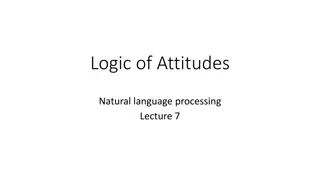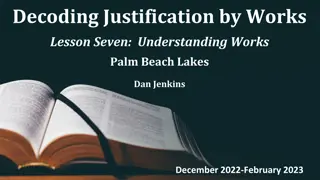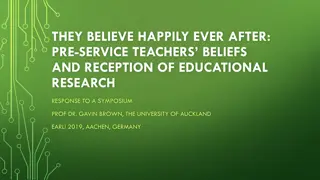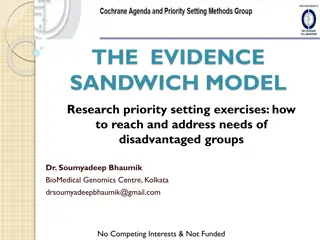Change Control in Pharmaceutical Industry
Change control in the pharmaceutical industry is a critical process that ensures the management of alterations to maintain product quality and compliance with regulatory standards. It involves categorizing changes as minor, major, or critical, each requiring specific handling to minimize risks and u
2 views • 14 slides
The Truth of Righteousness by Faith Message in Laodicean Context
Understanding the significance of righteousness by faith message is crucial for Christians, especially in today's Laodicean condition. The message emphasizes justification through faith in Christ, leading to obedience to God's commandments and holy living. Encouraging believers to seek righteousness
0 views • 35 slides
Understanding Epistemic Progression in Learning: A Humanities Perspective
Exploring the concept of epistemic progression and its importance in education, this content delves into Basil Bernstein's theories on knowledge structure, trends in history education, and the role of procedural knowledge in fostering progression in disciplines like History.
1 views • 10 slides
Decolonising the Curriculum Why, What and How
Explore the complexities of decolonising the curriculum in Scottish education, addressing epistemic privilege, Black History Month, Scottish history and colonialism, missionary movements, and the nuances of the curriculum itself. Consider the purpose and impact of decolonisation efforts in reshaping
1 views • 24 slides
MURTI Faculty Fellow Application Format and Research Proposal
This comprehensive document outlines the application format and requirements for the MURTI Faculty Fellow, including details on past projects, publications, grants, proposed research, and justification for consideration. It covers various aspects such as ongoing/completed grants, national and intern
0 views • 8 slides
Competition Law and Sports Governance: Analysis of ESL, ISU, and Royal Antwerp Cases
This presentation delves into the intersection of competition law and sports governance, focusing on landmark cases such as ESL, ISU, and Royal Antwerp. It explores the positioning of sports governing bodies, the legitimacy of their authority, gatekeeping powers, and the specific challenges faced in
1 views • 24 slides
Understanding Purchasing Forms and When to Use Them
Locating and completing purchasing forms is essential for managing procurement processes efficiently. Forms such as Purchase Justification, Emergency Procurement Justification, Sole Source Justification, and Change Order Form have specific purposes and guidelines for completion, ensuring that necess
1 views • 19 slides
Understanding Modal Verbs: Epistemic and Deontic Uses
Modal verbs, such as can, could, may, must, will, and should, play a crucial role in expressing modality in English. This content discusses the epistemic and deontic uses of modal verbs, illustrating how they convey likelihood, ability, permission, suggestions, obligations, and advice. Explore the n
0 views • 34 slides
Discursive Construction of Legitimation: Understanding Authority and Ideology
Systems of authority aim to establish legitimacy through discourses. Legitimation involves self-orientation, justification, and the imposition of ideologies. This practice encompasses various principles and categories such as moral evaluation, rationalization, and multimodal approaches, shaping soci
1 views • 36 slides
Enhancing Teaching Through Curriculum Design Coherence Model
Explore the use of the Curriculum Design Coherence Model (CDC) for designing effective lectures and guiding pre-service teachers in creating coherent lesson plans. Learn about epistemic progression, systematic ordering of knowledge, types of knowledge, and Bernsteins's knowledge structures to design
0 views • 26 slides
Transformative Journey of Justification and New Life in Romans
Explores the profound concepts of justification, new life, and the promise of life in our bodies according to biblical verses from Romans. The images complement the spiritual journey depicted in the verses, illustrating the transition from earthly to heavenly likeness and the transformative power of
1 views • 14 slides
Understanding Criminal Offences: A Comparative Analysis
Exploring the concept of criminal offences, this article delves into the definitions in common law and continental law systems. It discusses the structural elements, harmful nature, prohibition, punishment, and distinctive aspects of criminal acts. A comparison between common law and continental law
1 views • 33 slides
Aristotle's Justification of Hierarchy and Republican Aspects of Citizenship
Aristotle's concept of citizenship involves a hierarchical structure where ruling and being ruled in turn is essential. He justifies this hierarchy by emphasizing the advantageous nature of ruling and being ruled. However, his views on citizenship in Greek city-states were limited to adult males, hi
4 views • 6 slides
Guideline for Statin Management in High-Risk Groups - 2018 ACC/AHA
This guideline outlines the management of blood cholesterol in high-risk groups according to the 2018 ACC/AHA recommendations. It discusses the overall approach, different statin management groups, justification for statin use in high-risk populations, high and moderate-intensity statin therapy, and
1 views • 14 slides
IWG Measurement Uncertainties: Justification of Impact Quantities
Explore the justification of main impact quantities in IWG Measurement Uncertainties session held on 6th and 7th October 2020. The analysis includes factors such as deviation from centered driving, start of acceleration, speed variations, load variations, background noise, temperature effects on noi
3 views • 25 slides
The Book of Romans: Themes of Justification and Sanctification
The Book of Romans delves into the themes of justification, sin, sanctification, and service. It emphasizes that salvation is available through obedient faith in Jesus Christ. The need for God's righteousness is explored, along with the provision and effect of God's righteousness through Christ. The
2 views • 6 slides
Enhancing Children's Hybrid Integration Through Dialogue in Education
Presenting research results on enhancing children's agency and hybrid integration through dialogic interactions in school settings, specifically focusing on children with migrant backgrounds. The project aims to propose effective facilitation methods to support the participation of children with mig
0 views • 28 slides
Understanding the Importance of Justification and Distinction Between Law and Gospel
Exploring the crucial role of the doctrine of justification and the need to maintain the distinction between Law and Gospel in the Bible. Reflecting on the journey of knowledge from arrival at university to recognizing one's ignorance. Emphasizing the humility in acknowledging the vastness of ignora
0 views • 21 slides
Exploring Inductive Inferences and Their Relation to Probability
Nevin Climenhaga delves into the world of inductive inferences, categorizing them into downward, upward, and sideways forms. He discusses connections with probability, confirmation, epistemic defeat, and more, emphasizing the distinction between direct and indirect forms of inferences.
0 views • 15 slides
Understanding Justification Through Faith in Christ
Delve into the theme of Confident Hope, as Jesus teaches about faith in Unit I. The lesson explores seeking reconciliation and justification through faith, with key passages from Isaiah and Romans. Discover the essence of faith, grace, peace, and more in the Biblical context, guiding you to celebrat
0 views • 20 slides
Understanding Active Inference and Epistemic Value in Decision Behavior
This study presents a formal framework for decision-making, suggesting that agents minimize expected free energy of future outcomes by balancing extrinsic and epistemic values. By maximizing information gain and reducing uncertainty, agents navigate the exploration-exploitation dilemma. The strategy
0 views • 18 slides
Understanding Epistemic Network Analysis in Data Studies
Epistemic Network Analysis (ENA) is a method for studying relationships between elements in coded data with various applications. It involves analyzing nodes as occurrences of codes and links as co-occurrences of codes. Using examples like analyzing quitting behavior in a game, ENA can compare group
0 views • 30 slides
Exploring Key Debates in Peace Education by Prof. Vanessa Andreotti
Dive into the intricacies of peace education through the lens of Prof. Vanessa Andreotti, examining the Magolda Model of Epistemic Development. Explore themes such as violence vs. non-violence, complexity of human beings, empathy, critical thinking, and promoting heroic imagination towards cultivati
0 views • 12 slides
Twelve Great Truths about Justification in Romans 3:21-31
Explore the profound truths of justification found in Romans 3:21-31 as presented by Dr. Danny Akin, President of Southeastern Baptist Theological Seminary. Delve into concepts such as the role of good works, faith in Jesus Christ, the necessity of justification for all, and the demonstration of God
0 views • 23 slides
Reflections on Values and Identity in Research by David Hildebrand: A Critical Analysis
Delve into thought-provoking questions raised by Sami Pihlström on David Hildebrand's paper, exploring themes such as the impact of changing fundamental values on personal identity, the concept of reflective equilibrium in research methodologies, the significance of core values, the interplay betwe
0 views • 8 slides
Theoretical Justification of Popular Link Prediction Heuristics
This content discusses the theoretical justification of popular link prediction heuristics such as predicting connections between nodes based on common neighbors, shortest paths, and weights assigned to low-degree common neighbors. It also explores link prediction generative models and previous empi
0 views • 39 slides
Enhancing Curriculum Coherence for Deep Learning: A Model-driven Approach
Addressing the disconnect between conceptual knowledge and applied competencies in education, the Curriculum Design Coherence Model offers a structured framework to create coherence for deep learning. Developed in response to educational challenges such as skills versus knowledge imbalance and fragm
1 views • 28 slides
Living Unashamed: A Recap of Romans and Being Dead to Sin
The scripture from Romans 1:16 highlights the power of the Gospel for salvation. The journey through Romans emphasizes mankind's need for God's righteousness, His provision for justification, and the process of sanctification. The concept of being dead to sin but alive to God is explored, emphasizin
0 views • 13 slides
Understanding the Stages of Salvation
The stages of salvation are outlined through various scriptures, depicting the status prior to justification as sinners, powerless, ungodly, and destined to die. The process of justification is explained, contrasting it with concepts like being acquitted, pardoned, or paroled. Justification is defin
0 views • 36 slides
Critique of Convergent Realism by Larry Laudan
Larry Laudan's "A Confutation of Convergent Realism" challenges the notion of epistemic realism by arguing that historical evidence does not fully support it. He discusses Convergent Epistemological Realism (CER) and presents abductive arguments questioning the truth and empirical success of scienti
0 views • 18 slides
The Free Energy Principle and Active Inference in Cognitive Dynamics
This overview of the free energy principle by Karl Friston delves into how conscious operations are linked to inferring causes of sensations, emphasizing the necessity of probabilistic beliefs about external states. The discussion includes topics like embodied exchange with the world, ergodic system
0 views • 32 slides
Understanding J.S. Mill's Justification of Utilitarianism
J.S. Mill's Utilitarianism posits that actions are morally right if they promote happiness and wrong if they lead to unhappiness. Mill's proof of the principle of utility is based on empiricism and the desire for happiness as a desirable end. He argues that happiness is inherently desirable based on
0 views • 20 slides
The Book of Romans: Theme of Justification in Salvation
The Book of Romans emphasizes the theme of justification through obedient faith in Jesus Christ for salvation. It discusses the need for God's righteousness, provision of righteousness through justification, sanctification, and the practical implications in Christian service.
0 views • 6 slides
Exploring the Intersection of Social Epistemology and Mathematics
Delve into the intertwining realms of social epistemology and mathematics, examining the collaborative knowledge creation within the mathematical community. This work emphasizes the social dimensions influencing mathematical practices and the epistemic norms shaping reliable mathematical knowledge.
0 views • 15 slides
The Politics and Ethics of Knowledge Production in Migration Studies by Sari Hanafi
This insightful study delves into the politics and ethics surrounding knowledge production in migration studies. It explores the normativity of migration studies, identity politics, and universalism, while emphasizing the importance of ethics and epistemic community. The discourse also touches upon
0 views • 16 slides
Understanding Propositional and Notional Attitudes in Logic and Natural Language Processing
Explore the intricate concepts of propositional and notional attitudes in the context of logic and natural language processing. Dive into the distinctions between belief, knowledge, seeking, finding, solving, wishing, and wanting within the realms of individual intensions and hyper-intensions. Under
0 views • 16 slides
Understanding the Concept of Justification by Works
Explore the relationship between grace, faith, and works in the context of salvation. Discover how grace restores our relationship with God, leading to justification through faith in Him. Delve into the theological foundation of being declared just by God despite imperfections in a thought-provoking
0 views • 15 slides
Pre-Service Teachers' Beliefs and Reception of Educational Research
Exploring the awareness and trust of pre-service teachers in educational psychology misconceptions, epistemic trust in educational scientists, questioning prior beliefs when faced with evidence, and beliefs about the instrumental quality of information sources for teaching. The symposium delves into
0 views • 10 slides
Understanding Justification by Faith in Christianity
The study of Christianity delves into the complex relationship between faith and works, particularly focusing on the concept of justification by faith. Explore the significance of Martin Luther's teachings on justification and the impact of his ideas on the Protestant Reformation.
0 views • 28 slides
Evidence Sandwich Model: Addressing Needs of Disadvantaged Groups
In a world of medical advancements, reaching those in resource-poor settings remains a challenge. The Evidence Sandwich Model explores ways to prioritize research, collaborate, and tackle implementation bottlenecks to deliver basic care to disadvantaged populations. Led by Dr. Soumyadeep Bhaumik, th
0 views • 18 slides

